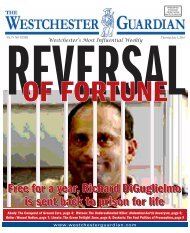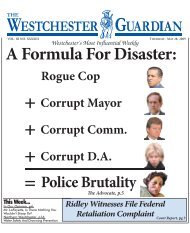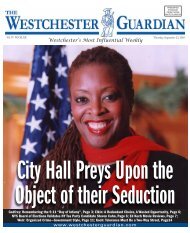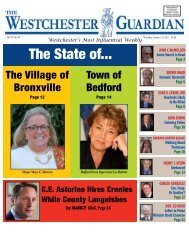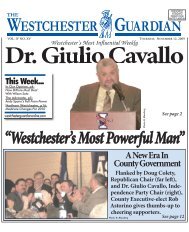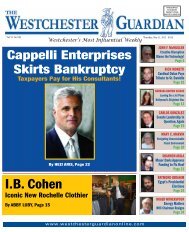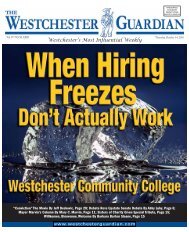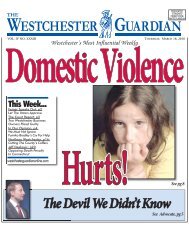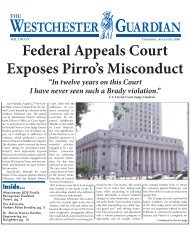HAPPY NEW YEAR - WestchesterGuardian.com
HAPPY NEW YEAR - WestchesterGuardian.com
HAPPY NEW YEAR - WestchesterGuardian.com
Create successful ePaper yourself
Turn your PDF publications into a flip-book with our unique Google optimized e-Paper software.
The Westchester Guardian THURSDAY, DECEMBER 30, 2010<br />
Page 19<br />
TECHNOLOGY<br />
Finally…FCC Officially Takes Action On Net Neutrality!<br />
By Bary Alyssa Johnson<br />
Last week the<br />
Federal Communications<br />
Commission<br />
(FCC) announced the<br />
adoption of a longdebated<br />
Order to enforce “net neutrality,”<br />
a catchphrase used to describe the preservation<br />
of a free and open Internet that<br />
garners <strong>com</strong>petition and innovation on the<br />
Web. In theory, Internet “gatekeepers” will<br />
be a thing of the past, no longer limiting<br />
innovation and <strong>com</strong>munication through<br />
the network, according to officials.<br />
The vote just barely passed in favor<br />
of these net neutrality rules and ordinances<br />
with a vote of 3-2. Chairman Julius<br />
Genachowski along with Commissioner<br />
Michael J. Copps gave their full support to<br />
the new Order. Commissioners Robert M.<br />
McDowell and Meredith Attwell Baker<br />
voted against the Order.<br />
The deciding vote, cast by<br />
Commissioner Mignon L. Clyburn officially<br />
counted in favor of adopting the<br />
Order. However, Clyburn made quite clear<br />
that while some of the rules being adopted<br />
are acceptable, others are <strong>com</strong>pletely<br />
unwarranted.<br />
“I [have] discussed the importance of<br />
collaboration in tackling the…policy issues<br />
in crafting a framework that gives broadband<br />
providers and consumers…guidance<br />
about what provider behavior is acceptable,”<br />
Clyburn said in an official statement.<br />
“Left to my own devices, there are Issues<br />
I would have tackled different…There<br />
are several areas in the Order that I would<br />
have strengthened so that more consumers<br />
would benefit from the protections we are<br />
adopting.”<br />
(L-R): Commissioner Mignon L. Clyburn, Commissioner Michael J. Copps, Chairman Julius<br />
Genachowski, Commissioner Robert M. McDowell, Commissioner Meredith Attwell Baker.<br />
Although the Order in its entirety has<br />
not yet gone public , the Commission has<br />
outlined 3 Key Provisions it will seek to<br />
enforce:<br />
Rule 1: Transparency – This except<br />
stipulates that Broadband providers make<br />
public all information regarding management<br />
of network, performance and terms<br />
of its services. This is all in a bid to keep<br />
consumers informed of their choices.<br />
Rules 2: No Blocking – This rule bars<br />
fixed Broadband Internet Access Providers<br />
from blocking legal content, applications<br />
and services insofar as the network is<br />
able to manage. The same rules apply to<br />
mobile broadband Internet access services,<br />
including voice and video-telephony offerings,<br />
but are said to be less severe.<br />
Rule 3: No Unreasonable<br />
Discrimination – Lastly, providers of fixed<br />
Broadband Internet Access Services are<br />
banned from unreasonable discrimination<br />
in transmitting network traffic through<br />
the consumers service provider. In other<br />
words, there shall be no more favoring of<br />
one site over another site as seen in the past<br />
issues with <strong>com</strong>panies including Vonage &<br />
Comcast.<br />
While Congress has handed over the<br />
net neutrality Order to the FCC to implement<br />
the rules, an Open Internet Advisory<br />
Committee will also be created to assist.<br />
It will be made up of consumer advocates,<br />
providers and equipment makers<br />
and will monitor the state of “openness”<br />
on the Internet and advise the FCC on<br />
technical standards, according to an FCC<br />
representative.<br />
The net neutrality rules, which are<br />
slated to go into effect by March 2011, are<br />
reported to be subject to heavy resistance<br />
from many Republican Party officials, who<br />
sources say would like to see President<br />
Obama veto the adoption of the Order as<br />
its currently written.<br />
However, net neutrality has been an<br />
issue debated by the FCC since circa 2005<br />
and the Order being implemented is the<br />
result of a public rulemaking process that<br />
began in late 2009. The process included<br />
numerous public workshops and <strong>com</strong>bined<br />
data from over 100,000 individuals and<br />
organizations. The Republican Party may<br />
find their attempts to nullify the work<br />
of the FCC brutally rebuffed, especially<br />
after Obama’s public endorsement of net<br />
neutrality.<br />
The President reportedly endorsed the<br />
FCC’s actions, saying the new Order will<br />
“help preserve the free and open nature of<br />
the Internet.”<br />
Republican hopes have a chance to<br />
be rallied, however, by a harsh dissenting<br />
statement made by Commissioner Baker.<br />
Baker maintains that the Internet is open<br />
today already and evidentiary support<br />
from the FCC’s recent proceedings have<br />
effectively reaffirmed that government<br />
action is not needed to preserve it. Others<br />
reportedly agree that the FCC is making<br />
unnecessary efforts toward a potential<br />
“what if?” scenario that may play out some<br />
time in the future.<br />
“In the final analysis, the Commission<br />
intervenes to regulate the Internet because<br />
it wants to, not because it needs to,” Baker<br />
said in an official statement. “I cannot<br />
support this decision…The majority<br />
bypasses a market power analysis altogether<br />
and acts on speculative harms alone.<br />
Only time will tell whether the efforts<br />
to put the net neutrality Order in place will<br />
hold strong, or if they will possibly cave<br />
into overwhelming pressure<br />
Local resident Bary Alyssa Johnson covers<br />
Larchmont, Mamaroneck, Rye, and Rye<br />
Brook, as well as the evolving world of electronics<br />
and technology.<br />
New York State Pushes for Proper Electronics Recycling Programs<br />
By Bary Alyssa Johnson<br />
New York Governor David Paterson<br />
signed into law the New York State<br />
Electronic Equipment Recycling &<br />
Reuse Act on May 28, 2010, in a bid<br />
to encourage recycling of “ewaste” by<br />
consumers and electronics manufacturers<br />
alike.<br />
The legislation was designed to<br />
ensure that all residents in the State of<br />
New York will be able to recycle their<br />
electronic waste in an eco-friendly<br />
manner. Numerous products fall under<br />
the category of ewaste, including<br />
desktop <strong>com</strong>puters, monitors, cell<br />
phones, laptops, MP3 players and many,<br />
many more.<br />
As it is written, the law requires<br />
consumer electronics (CE) manufacturers<br />
to take on the challenge of devising<br />
an acceptable acceptance program for<br />
the collection and proper disposal of<br />
ewaste by way of a very specific recycling<br />
regimen. This acceptance program<br />
will be devised with oversight by the<br />
NYS Department of Environmental<br />
Conservation.<br />
The new recycling rules are set to go<br />
into place beginning April 1, 2011. At<br />
that time, all CE manufacturers will be<br />
required to accept almost all CE products<br />
for proper disposal. These manufacturers<br />
Continued on page 20




